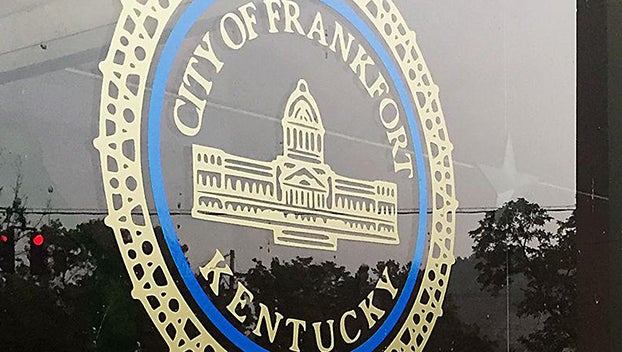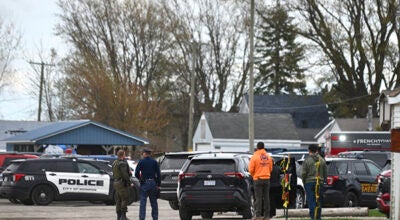‘A systemic problem’ — evictions continue in Kentucky’s Capitol City despite moratorium
Published 5:42 am Wednesday, May 19, 2021
For the past eight months there has been a national moratorium on evictions to curb both the spread and impact of COVID-19.
However, since that time more than 300 evictions have been filed in Franklin County. In 2020 there were 354 total evictions filed, compared to 642 in 2019, according to state data. More than 100 have been filed thus far in 2021.
The U.S. Centers for Disease Control and Prevention released a moratorium on evictions in September 2020. Through the pandemic, the moratorium was extended and is now set to expire June 30.
In Frankfort, community leaders and organizers pointed to loopholes in the moratoriums that allowed evictions to continue, and a systemic lack of public housing that has made finding a new home more difficult during the pandemic.
Natalee Cleveland, a community advocate who has lived in Frankfort essentially all of her life, worked with several renters who were evicted during the pandemic. At the time she said there was a lot of confusion and outrage that people were still being evicted despite federal and state actions to prevent it from happening.
The CDC moratorium only protects in cases of eviction due to non-payment. In several instances, Cleveland said an owner was able to still evict their tenants because of a change in ownership, or if a lease was up despite a tenant living there for years.
While tenants in those situations are often given 30 days’ notice, she cited a severe lack of affordable public housing that would make finding a new home in that period difficult for a low-income person.
Cleveland said that many of the eviction cases she’s noticed have taken place in historically Black communities.
“So many things had to be done to help this person who was trying to help themselves,” Cleveland said. “They’ve been working while the pandemic was going on … they’re doing everything they should do, but their house was being taken from underneath them with no help to find somewhere to go.”
When the pandemic began in 2020, organizations like the Homeless and Housing Coalition of Kentucky (HHCK) began to notice just how unaffordable housing is, especially for low-income Kentuckians, as small or large disruptions in income could have a serious effect on housing.
“Our focus over the last year has been relentless on trying to save people’s lives by either allowing them to remain healthy at home or trying to get them housed,” said Adrienne Bush, executive director of HHCK.
HHCK is both an advocacy group trying to influence state and federal housing policy and an organization that operates homeless assistance programs. If someone in Franklin County or a surrounding county is experiencing homelessness they can contact HHCK for assistance vouchers and other services.
Some evictions are still happening due to non-payment, but Bush said she is seeing more evictions due to lease violations or a lease term ending and a landlord deciding to not renew, which is still permissible.
If a landlord does file an eviction for non-payment of rent, the renter must claim the protections by signing a declaration that they are covered by the CDC order, that they only have a certain amount of income and that they have attempted to apply or receive rental assistance.
Not all renters are necessarily aware of those steps, however, and lawyers for landlords can challenge the declaration made by the tenant, Bush explained.
Another path available during the pandemic is the Healthy At Home Eviction Relief Fund, which opened online on Feb. 15. Bush said due to the sheer demand and number of people behind on rent, it has taken a while for applications to be processed and to get all the money out.
Bush said she’s primarily found the landlords driving eviction activity are running larger housing corporations, rather than the smaller landlord who owns a few properties.
At HHCK, she said there is a push to spread information to renters and landlords. However, she’s heard complaints from landlords that the paperwork is burdensome, and it’s sometimes easier to take the eviction route.
“I think it’s an interesting point that we’re OK with making complex applications and hard-to-follow rules for poor people, but the moment that there’s a little bit of inconvenience, property owners are able to just walk away because there’s no requirement that they take the rental assistance,” Bush said. “And so an eviction can still go through, even if they’ve refused to participate in the process.”
Taylor Marshall, a local landlord and developer, said in his 100 units he has only evicted one person during the pandemic. During this time, he added, several tenants have relied on the KY Eviction Relief Fund for assistance.
“All my tenants have been fantastic, and they’ve worked really hard to make it work,” Marshall said, “… It’s been great, but I know that’s not true for everybody.”
Robert Roach, a former city commissioner who owns rental properties in Franklin County, said his business has sustained a “moderate” hit to its bottom line due to the moratorium.
He said he has followed through with “a handful” of evictions since the pandemic began.
“It’s a lower number than normal,” Roach said. “All the ones we would have evicted would be somebody violating the lease, or we may have had an occasion of one not showing up. Then if we choose not to renew somebody’s lease, they sometimes don’t leave, and you may have to evict them over that.”
Roach said he initially didn’t take funding from the federal government because he didn’t believe in it from a policy perspective; he later ended up taking assistance as the deadline for the eviction moratorium kept extending.
“The fundamental question is if it’s proper for the government by mandate to not allow this type of contract to be enforced due to a pandemic,” Roach said. “We’re just doing the best we can in a difficult situation. I feel sorry for people that have lost their jobs. It’s just been a real mess.”
Safety concerns caused decreased shelter capacity
Once the pandemic began, Frankfort shelters made adjustments to continue to serve those who needed a place to stay, while maintaining social distancing guidelines and safety measures.
Janet Gates, executive director of Franklin County Women and Family Shelter, said they went to half capacity and once that limit was met, they would refer families to other shelters or services.
Before the regulations, Gates said, the shelter had 21 beds to fill on any day. In 2020 she said they received 330 requests for shelter, but due to capacity regulations were able to provide shelter for 51 individuals. In a given year, she said the shelter typically gets 350 to 400 requests for shelter.
Gates added the average stay in 2020 was longer than a normal year at 140 days.
As all shelters in the community had to greatly reduce capacity and were therefore unable to meet all of the need for shelter, Gates said Simon House and ACCESS Men’s Shelter and Soup Kitchen opened a pop-up emergency shelter at the F.D. Wilkinson Gym, which was in use for about three months and served 81 different people.
Gates said many in the community were aware shelters could not meet the needs with the space they have. She explained the CARES Coalition was created in the fall of 2020 to address this need, and in July they are expecting to open a new emergency shelter that can serve as a first stop before an individual or family goes to Franklin County Women and Family Shelter.
Given the increased attention on public housing in the area, Gates said it’s important to look for ways to increase the number of available affordable housing spaces through incentivizing and working with property owners and looking at other public housing models across the country.
Katherine Mueller, storybanking coordinator for HHCK, said public housing should be considered part of infrastructure because it is an essential part of building a community. She added congregate living like shelters should be considered more of a quick fix before finding a permanent space.
“We cannot have a community that runs well if everybody doesn’t have a place to go,” Mueller said.
Issues with affordable housing
While the pandemic exacerbated housing concerns, the availability of public housing and general affordability is not a new issue.
Mueller said she hears from people living in shelters, and in both rural and urban communities, that the top issue can be traced back to a lack of Section 8 and affordable housing.
“It doesn’t matter if they are having housing issues pre-COVID or having housing issues because of COVID,” Mueller said. “The problem is always lack of affordable housing units, 100% of the time.”
Within that shortage Mueller said she frequently hears of landlords, primarily in Lexington, refusing to accept public housing vouchers and letting apartments sit empty. In some areas she pointed out the waitlist for Section 8 housing can be up to two years.
During COVID-19, an additional concern if someone does get evicted despite the moratoriums and available funding, it is difficult to find a new, affordable space.
Bush said only one in four families nationwide that are income-eligible for Section 8 housing or public housing actually receive it due to high demand. In Kentucky specifically Bush said 77,000 affordable homes for low-income families were needed to fit the demand just before the pandemic.
Now she said the rental market is one of the tightest she’s seen in 20 years, as rental units are being purchased, renovated and rented at a higher rate.
“When you already have an inadequate supply of affordable housing, and then you compound that with when you do have property purchases and you do take rental units that were affordable and now they are not, yeah, that’s a real problem,” Bush said.
The issue of evictions continuing despite the moratorium has been reported widely across the state and nation. In Louisville and Jefferson County, a Courier Journal report found that judges ruled against tenants in over 1,200 eviction cases between August and December. The story also noted similar loopholes in the moratorium being used to evict tenants.
In Frankfort there are 207 public housing units, with waiting lists ranging in time, said David Small, executive director of the Frankfort Housing Authority. In one-person units, he said, the waiting lists could run closer to a year, however, he said most other waiting lists have a shorter turnaround time.
“I feel like we do have a lot of housing that’s maybe not affordable to low-income families in the general housing market,” Small said. “For us to have more public housing, we could probably have a few more, but as general rule now it seems we pretty well meet what we need.”
From what he’s witnessed in Frankfort, the only evictions happening in the community are related to lease violations or if a landlord decides to not renew. Still, Small said the last option is to evict a tenant, and the majority of landlords in the community have been flexible and understanding during the pandemic in his experience.
However, Bush said the U.S. is hopefully in the process of reversing a trend of disinvesting in public housing on a federal level, and pointed to the American Rescue Plan, which in part is aimed at funding more public housing and reducing homelessness.
“I think there is finally a recognition, especially in smaller communities, that people’s housing situations were not good in the pandemic,” Bush said.
Before the pandemic, public housing was a “hidden problem,” and an issue people didn’t associate with smaller communities like Frankfort, Bush said. Through the past year, however, she said it’s become more clear how unaffordable housing is for low- and moderate-income Kentuckians, in any county.
“It’s not about any one person or household’s poor financial planning,” Bush said. “This is a systemic problem that needs systemic solutions.”
For her part, Cleveland emphasized the need to address the lack of public housing in Frankfort. She suggested making sure income status is not a barrier to finding housing, making sure a portion of all apartment complexes is open to Section 8 and public housing and introducing programming in the city to better educate people on owning a home rather than renting.
“In no county in Kentucky do we have a sufficient supply of affordable housing,” Bush said. “This isn’t a problem without a solution. We just have to put the resources together to make it happen.”






